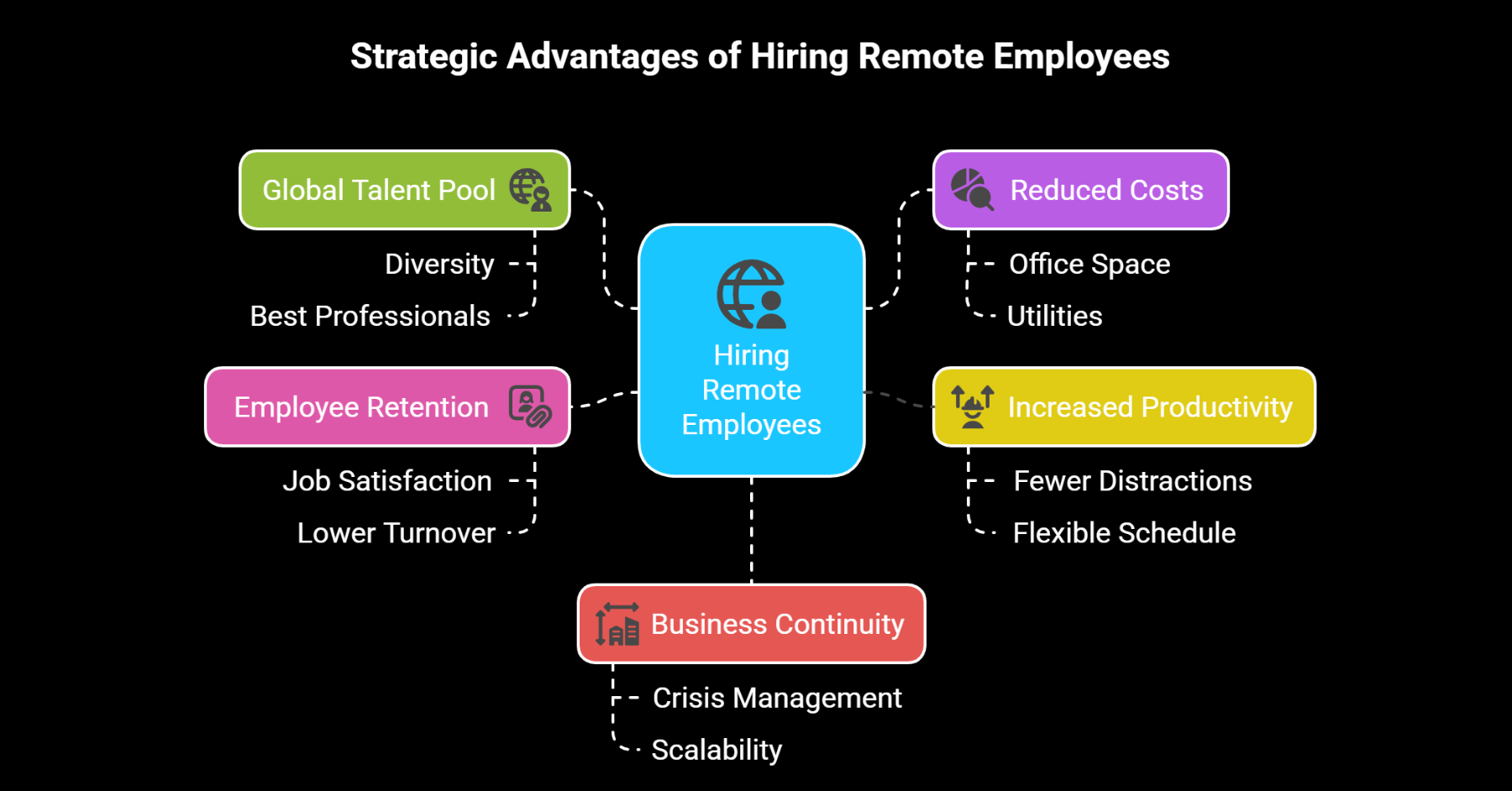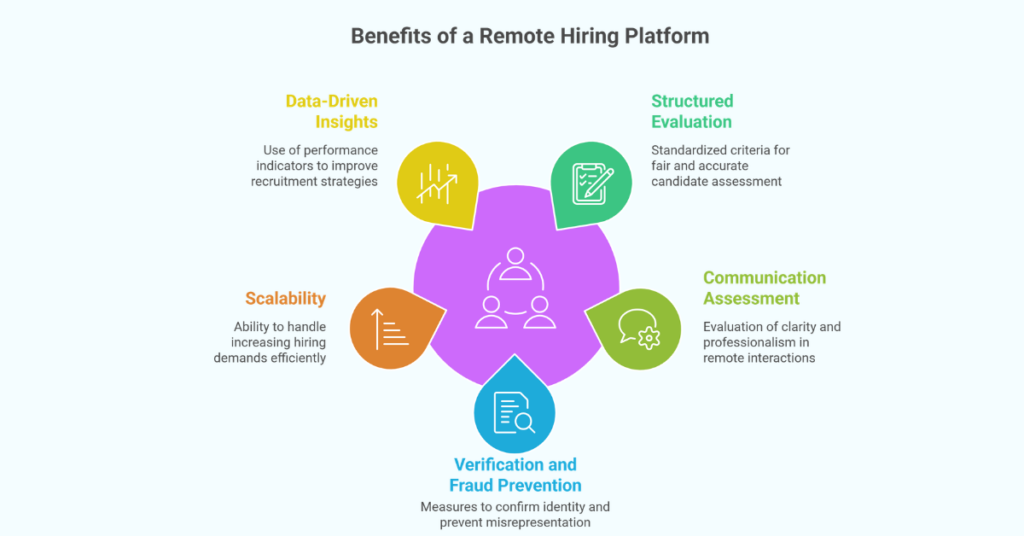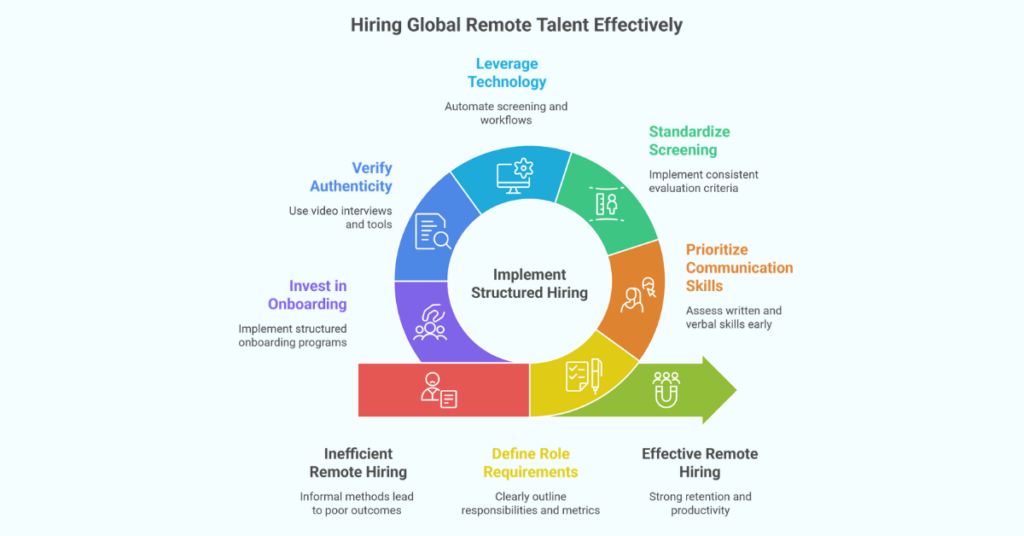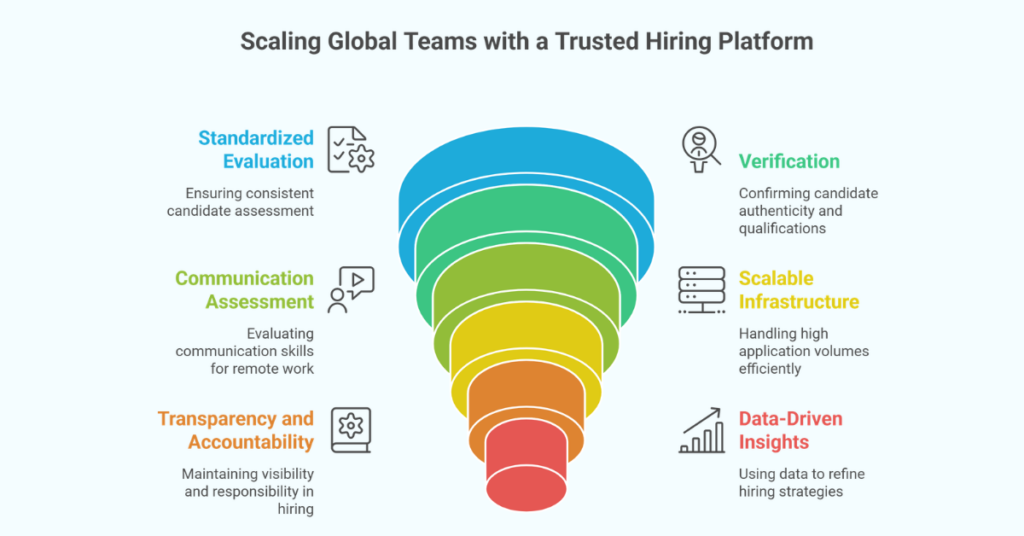“Hire remote employees to build a world-class team, access top global talent, and drive business success with a strategic and flexible workforce.”
The demand for remote employees is at an all-time high, with companies worldwide recognizing the benefits of hiring beyond geographical limits. Businesses that hire remote employees gain access to top-tier talent, reduce overhead costs, and build highly productive teams. Whether you’re a startup looking to scale or a multinational company expanding operations, remote hiring provides a strategic advantage.
Building a world-class remote team requires a structured approach—from sourcing top talent to managing and motivating employees across different time zones. Companies must also navigate legal and compliance challenges, ensuring smooth contracts and payroll processing for remote workers. Successful remote hiring is not just about filling positions but about creating a cohesive, efficient, and engaged workforce.
This article explores how to hire remote employees, the benefits of remote hiring, best practices for managing remote teams, and the key legal considerations for global remote work. Whether you’re new to remote hiring or refining your strategy, this guide will help you build a high-performing distributed team that drives business success.
Why Businesses Should Hire Remote Employees
Hiring remote employees offers several strategic advantages, making it a preferred option for businesses worldwide.
-
Access to a Global Talent Pool
Remote hiring allows companies to recruit the best professionals worldwide rather than being limited to local talent. This expands hiring opportunities and improves workforce diversity. -
Reduced Operational Costs
Businesses save on office space, utilities, and commuting expenses by allowing employees to work remotely. This significantly reduces overhead while maintaining productivity. -
Increased Employee Productivity
Studies show that remote employees often have higher productivity levels due to fewer workplace distractions, flexible work schedules, and better work-life balance. -
Better Employee Retention
Offering remote work improves job satisfaction, leading to lower employee turnover rates. Employees value flexibility, which results in long-term engagement and commitment. -
Business Continuity and Scalability
Remote teams ensure operational continuity during crises, such as natural disasters or global disruptions. They also allow businesses to scale without geographical limitations.
Steps to Build a Successful Remote Team
Creating a world-class remote team requires strategic planning, structured hiring, and effective management.
-
Define Job Roles and Remote Work Expectations
Clearly outline job responsibilities, required skills, work hours, and communication expectations to ensure candidates align with company needs. -
Use Digital Recruitment Platforms
Leveraging job boards, AI-driven recruitment tools, and professional networks helps companies source top remote talent efficiently. -
Conduct Structured Virtual Interviews
Video interviews help assess candidates’ communication skills, cultural fit, and ability to work independently. Using consistent interview questions ensures fair evaluations. -
Implement a Strong Onboarding Process
A seamless onboarding program includes virtual training, team introductions, and digital collaboration tools to integrate new hires effectively. -
Foster a Remote-Friendly Culture
Encouraging open communication, team bonding activities, and inclusivity ensures a strong company culture, even in a remote setup.
Best Practices for Managing and Motivating Remote Employees
Remote team management requires effective leadership, communication, and engagement strategies to ensure productivity.
-
Set Clear Goals and Expectations
Establishing key performance indicators (KPIs) and setting clear deadlines helps remote employees stay focused and aligned with business objectives. -
Leverage Communication and Collaboration Tools
Platforms like Slack, Zoom, and Asana facilitate smooth collaboration, ensuring teams stay connected regardless of location. -
Encourage Regular Check-ins and Feedback
Virtual one-on-one meetings and team check-ins help managers track employee progress, address concerns, and provide constructive feedback. -
Promote Work-Life Balance
Encouraging flexible work schedules and respecting employees’ personal time enhances motivation, reducing burnout and improving overall well-being. -
Recognize and Reward Performance
Employee recognition programs, virtual celebrations, and performance-based incentives boost morale and foster a sense of belonging in remote teams.
Legal and Compliance Considerations for Hiring Remote Workers Globally
Hiring remote employees across different countries involves legal, tax, and employment compliance challenges that businesses must address.
-
Understand Local Employment Laws
Each country has unique labor laws regarding contracts, benefits, and termination policies. Employers must ensure compliance to avoid legal risks. -
Set Up Payroll and Tax Compliance
Businesses must determine how to handle payroll, taxes, and benefits for remote employees in different regions. Using global payroll services simplifies this process. -
Provide Secure Remote Work Infrastructure
Implementing cybersecurity measures and ensuring compliance with data protection laws safeguard sensitive company information. -
Define Work Contracts and Agreements
Employment contracts should include job responsibilities, work hours, salary structure, confidentiality clauses, and dispute resolution terms. -
Consider Employer of Record (EOR) Services
Companies hiring remote employees internationally can use an Employer of Record service to handle compliance, payroll, and legal documentation.
A Simple Guide to Hiring Remote Employees
Remote hiring is a strategic approach that allows businesses to recruit top talent globally.
-
What is Remote Hiring?
The process of recruiting employees who work from locations outside the company’s physical office. -
Why Hire Remote Employees?
Remote hiring expands talent access, reduces costs, and increases productivity while offering employees work flexibility. -
How to Hire Remote Employees?
Use digital recruitment platforms like Remote Recruit, conduct structured interviews, and implement a strong onboarding process. -
Key Benefits of Remote Hiring:
- Access to a global workforce
- Lower operational costs
- Increased employee satisfaction
- Business continuity and scalability
-
How to Manage a Remote Team?
Establish clear communication, set performance expectations, and use digital collaboration tools to ensure team efficiency.
Solutions Provided by Remote Recruit
Remote Recruit simplifies the hiring process for businesses seeking to build world-class remote teams.
For employers, Remote Recruit offers AI-powered talent matching, video interview solutions, and legal compliance support. The platform ensures businesses can hire remote employees efficiently while handling payroll and global workforce regulations.
For job seekers, Remote Recruit connects professionals with top remote job opportunities, offering resume optimization, interview preparation, and career coaching. Candidates can access exclusive remote job listings and secure high-quality roles in leading industries.
Conclusion
Hiring remote employees is a game-changer for businesses seeking top talent, cost savings, and increased operational flexibility. With the right recruitment strategies, companies can build highly skilled remote teams that drive innovation and success. However, managing remote employees effectively requires structured hiring, clear expectations, and strong leadership.
Remote Recruit is the ideal solution for businesses looking to streamline remote hiring and for job seekers searching for top remote career opportunities. By leveraging AI-driven recruitment tools and expert hiring strategies, businesses can build a world-class team that thrives in a remote-first environment.
Start building your world-class remote team with Remote Recruit. Sign up today to find top talent and unlock the benefits of remote hiring!
Frequently Asked Questions (FAQs)
1. What are the best industries for hiring remote employees?
Tech, finance, marketing, and customer service industries offer the most remote job opportunities.
2. How can companies manage remote employees effectively?
Using communication tools, setting clear goals, and conducting regular check-ins help ensure productivity and engagement.
3. What are the legal challenges of hiring remote employees?
Businesses must comply with international labor laws, payroll regulations, and data security requirements when hiring remotely.
4. How do companies write a remote employee contract?
A remote work contract should include job responsibilities, salary details, work expectations, confidentiality terms, and termination policies.
5. How does Remote Recruit help businesses hire remote employees?
Remote Recruit provides AI-driven candidate matching, legal compliance support, and recruitment tools to streamline remote hiring.
